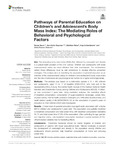2022-03-07Zeitschriftenartikel
Pathways of Parental Education on Children's and Adolescent's Body Mass Index: The Mediating Roles of Behavioral and Psychological Factors
Seum, Teresa
Meyrose, Ann-Katrin
Rabel, Matthias
Schienkiewitz, Anja
Ravens-Sieberer, Ulrike
Aim: The increasing body mass index (BMI) often followed by overweight and obesity is a global health problem of the 21st century. Children and adolescents with lower socioeconomic status are more affected than their counterparts. The mechanisms behind these differences must be well understood to develop effective prevention strategies. This analysis aims at examining the association of parental education as an indicator of the socioeconomic status on children's and adolescent's body mass index and the role of behavioral and psychological risk factors for a higher BMI longitudinally.
Methods: The analysis was based on a nationwide sample of N = 460 children and adolescents, aged 11 to 17 at baseline (2009–2012), who took part in the representative BELLA study, the mental health module of the German National Health Interview and Examination Survey among Children and Adolescents (KiGGS). A follow-up was conducted 5 years later. Using mediation analyses, the mediating effects of breakfast consumption, consumption of sugar-sweetened beverages, screen time, physical activity, mental health problems (Strengths and Difficulties Questionnaire), and health-related quality of life (KIDSCREEN-10) on the association of parent's years of education on their children's BMI were investigated.
Results: A lower level of parental education was significantly associated with a higher BMI in children and adolescents 5 years later. The association was partially mediated by breakfast consumption and total screen time, with breakfast consumption mediating 16.7% and total screen time 27.8% of the association. After controlling for age, gender, and migration status, only breakfast consumption remained a partial mediator (8.5%). Other included variables had no mediating effects.
Conclusions: Preventive measures should be mainly targeted at children and adolescents of parents with lower educational levels. Tailored strategies to prevent the development of overweight and obesity in this population among children and adolescents should promote daily breakfast consumption at home and reducing screen time.

